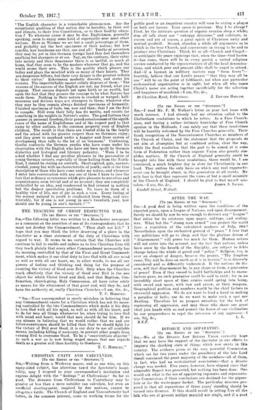GOETHE ON THE BRITISH.
[To rue Eurros or roe " 5rsorsroa."1
SIR,—The following extract from Goethe may possibly interest some of your readers who are asking themselves what the great masters of German culture previous to the rise of Prussianism would have thought of their country since it has learnt its new lesson of hate. The extract was quieted in Die Nene linndtchati of August, 1908, by Herr Saenger in an article entitled "Das linglische Vorbild." The object of this article is to indicate the superiority of English education to that forced upon the Germany of modern times. The writer of the article, after quoting Goethe, adds as his comment :— " Goethe, with the unerring instinct of genius, was not slow to apprehend the advantage which would ensue to any nation which would adopt the main characteristics of English education with the hygienic and ethical ideas which animate its society. Naturally enough, Goethe prized before all things the fresh originality and strength of will inculcated by the English system, with its high standard of morals. It may indeed be said that tho Anglo-Saxon type of personality stands for an example to all in this epoch of the nineteenth century. If it can be predicated of any national type that it stands as a model for the best modern upbringing, it is surely the Anglo-Saxon."
The writer in a bang article continues to disparage the false ideas of education prevalent in Germany, and to point out the results to which they are sure to lead, and indeed have led.—I am.
(Emeritus Professor, Liverpool University). Leghillock, Blairgoterie.
" Eckermann notes an interesting conversation held with Goethe on March 120i, 1828, on the subject of English life and character.
The English character is a remarkable phenomenon. Are the exceptional qualities of that nation due to heredity, to their soil and climate, to their free Constitution, or to their healthy educa- tion ? To whatever cause it may be due, Englishmen, generally speaking, seem to enjoy some kind of superiority over most other nations. Here in Weimar wo see but a small percentage of them, and probably not the best specimens of their nation; but how capable, how handsome are they, one and all! Youths of seventeen they may be, yet in this German foreign land they feel themselves anything but strangers or at sea. Nay, on the contrary, their entry into society and their demeanour there is so tactful, so much at home, that they seem to be the masters wherever they go. and the world seems their own. This is the quality which pleases our ladies and ploys the mischief with so many of their hearts. They are dangerous fellows, but their very danger is the greatest tribute to their virtue.' Eckermann modestly dissents, end states his reasons. The imperturbable master calmly disposes of them : ' The reasons of the success of the English are not, my friend, what you suppose. That success depends not upon birth or on wealth, but upon the fact that they possess the courage to be what Nature has made them. Nothing in their nature is crooked or warped; half- measures and devious ways ore strangers to them; whatever else they may be they remain always finished specimens of humanity. Finished specimens of fools, too, now and then; that I am the first to concede. Still even their folly has its merits, and counts for something In the weights in Nature's scales. The good fortune they possess in personal freedom, their proud consciousness of the signifi- cance of the name of Englishman and of the respect paid to that name by other nations, is the common property even of English children. The result is that these are treated alike in the family and the school with far greater respect than we Germans enjoy; and they grow to manhood under a happier and freer system of development than falls to the lot of us Germans: Continuing, Goethe contrasts the German youths who have come under his observation with the English who bare not been spoilt by German dialectics and historical and literary pedantry. ' Were I to be asked whether I find any peculiar pleasure in the personality of young German savants, especially of those hailing from the North- East, I should be stating an untruth. Short-sighted, pale, narrow. chested, young but with no characteristic of youth; such is the true description of those who have come under my notice; and whenever I enter into conversation with any one of them I have to face the fact that ordinary occurrences which give pleasure to ourselves and acquaintances seem trivial and of no account; they are completely enthralled by an idea, and condescend to find interest in nothing but the deepest speculative problems. No trace in them of healthy view of life, nor of joy in such a view. Every feeling of the ecstasy natural to youth is eradicated from them, and irre- trievably, for if one is not young in one's twentieth year, how should one be young in one's fortieth ?'"



































 Previous page
Previous page